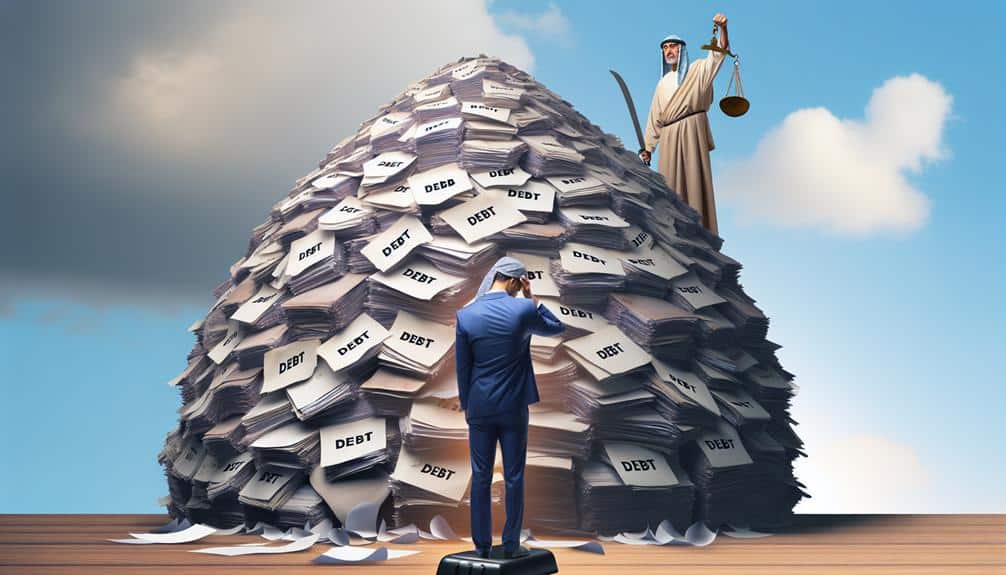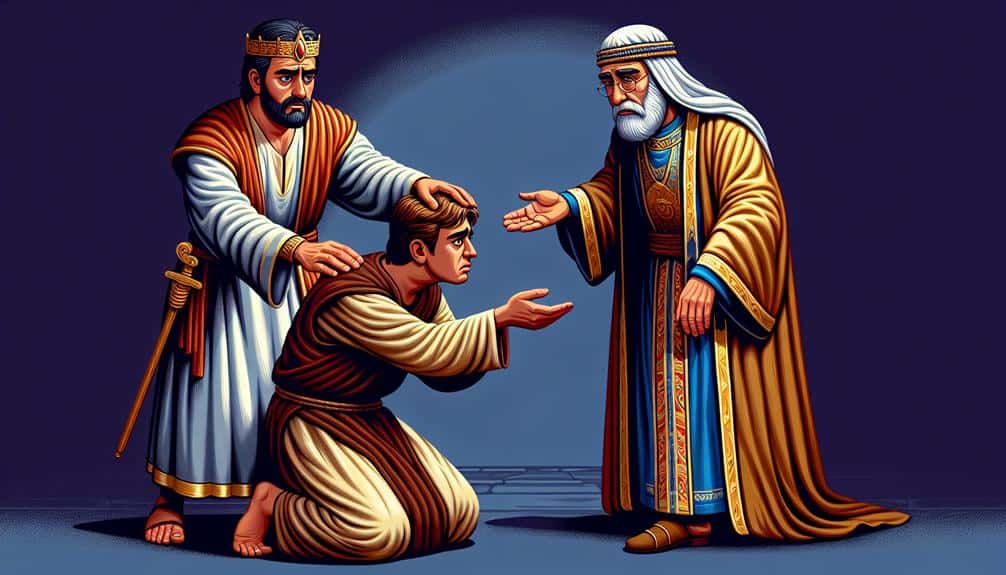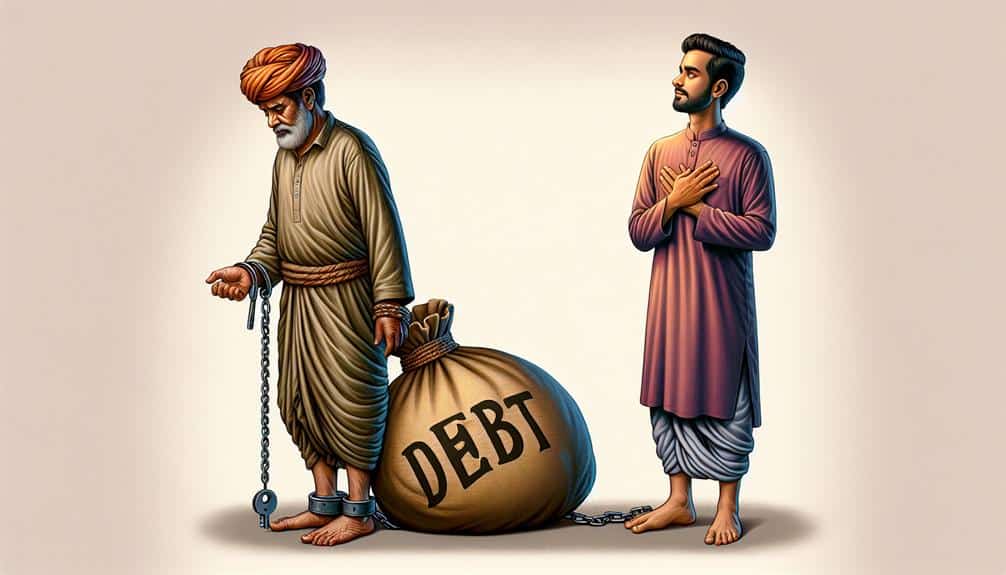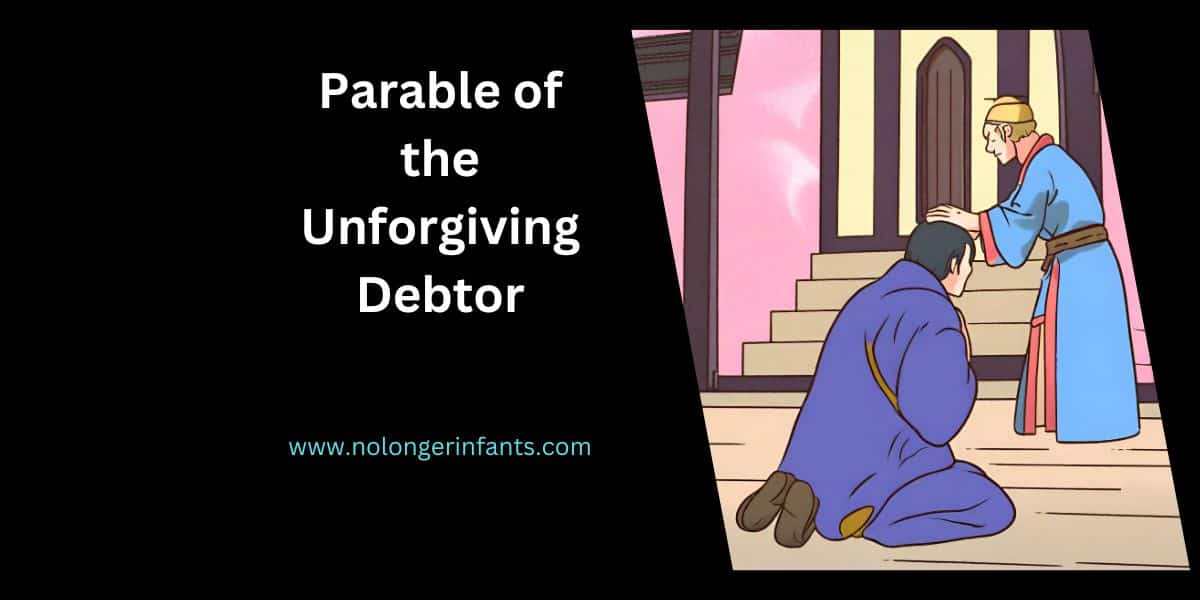Meaning of the Parable of the Unforgiving Debtor
Jesus used parables as a powerful teaching tool to teach a lesson he wanted his hearers to know.
In the parable of the unforgiving debtor, Jesus shares a thought-provoking tale that tackles the thorny issue of forgiveness. This story sheds light on the consequences of harboring a heart devoid of mercy and compassion, and it compels you to reconsider your attitude toward forgiveness.
As the parable unravels, you will encounter a debtor burdened by an insurmountable debt, a merciful and forgiving king, and a fellow servant who fails to extend the same forgiveness he received.
The depth and significance of this parable’s meaning will captivate you, leaving you eager to unearth its invaluable lessons.
There have been times in my life where people have wronged me. People have said bad things to me and bad things about me.
It was very hard for me to forgive them. For some, I was able to forgive them in a short space of time but for others, it took me more than a year to forgive them.
Forgiveness is not easy but it is worth it. We need God to help us to forgive others.
Sometimes it may be your fellow members of your church who hurt you.
As a Leader, some of the people who I helped for years have hurt me in ways I never expected.
Key Takeaways
- The parable of the Unforgiving Debtor teaches a lesson on forgiveness and highlights the importance of showing mercy and compassion.
- It emphasizes God’s willingness to forgive us and the expectation for us to extend forgiveness to others.
- The parable illustrates the consequences of refusing to forgive and highlights our indebtedness to God for our sins.
- It calls us to imitate God’s forgiveness and warns of the consequences of holding grudges.
The Passage

21 Then the Apostle Peter came to Jesus and asked, “Lord, what is the number of times shall I forgive my brother or sister who sins against me? Up to seven times?” 22 Jesus’ response was, “I tell you, not seven times, but seventy-seven times.
Matthew 18
In this parable, Jesus tells a story about a debtor who’s unable to repay a huge debt. The passage can be found in the book of Matthew, chapter 18, verses 23 to 35. It begins with a king who wants to settle accounts with his servants.
One servant owed him an incredibly large sum of money, ten thousand talents to be exact. Since the servant couldn’t pay, the king ordered him, his wife, and his child.
The King’s servant fell on his knees and begged the King for mercy, saying he’d repay everything. The King was moved with compassion and forgave the servant’s debt, canceling it altogether.
However, as soon as the servant left the King’s presence, he found a fellow servant who owed him a much smaller amount, a hundred denarii, and demanded immediate repayment. This was a small amount compared to his debt.
When the fellow slave couldn’t pay, the first servant imprisoned him until he could settle the small debt. Hearing this, the King summoned the first servant and confronted his lack of mercy.
The angry King handed him over to be tortured until he could pay back the original debt.
This parable teaches us about the importance of forgiveness and mercy. It highlights the hypocrisy of expecting forgiveness for ourselves while refusing to forgive others. It reminds us that God’s forgiveness is boundless, and we should imitate His mercy.
Background Behind the Parable of the Unforgiving Debtor
To understand the background behind the Parable of the Unforgiving Debtor, it’s essential to delve into the cultural context of Jesus’ time. In this parable, Jesus tells the story of a servant who owed a tremendous debt to his King. Peter’s question is a question we all have. Here are four key points to consider:
- Parable of the Unforgiving Servant: This parable is found in the Gospel of Matthew and serves as a lesson on forgiveness. It highlights the importance of showing mercy and compassion towards others, just as God leads us.
- Heavenly Father: The parable portrays the King in the story as a representation of God, the heavenly father. It emphasizes God’s willingness to forgive us and the expectation that we should extend the same forgiveness to others.
- Kingdom of Heaven: The parable teaches about the nature of the kingdom of heaven, where forgiveness and mercy are foundational principles. It reminds us that our actions on earth have eternal consequences.
- Forgiveness of God: The parable emphasizes God’s forgiveness towards us by illustrating the enormous debt the servant owed. It challenges us to reflect on God’s grace’s depth and extend that same forgiveness to those who wronged us.
Meaning of the Parable of the Unforgiving Debtor

Now, let’s explore the significance behind the Parable of the Unforgiving Debtor and its message on forgiveness. This parable, also known as the Parable of the Unmerciful Servant, teaches us about God’s forgiveness and the importance of extending that forgiveness to others.
The message behind this parable is clear: we are all indebted to God for our sins, yet He forgives us freely. However, if we are unwilling to forgive others, we act like the evil servant in the story. We are called to extend the same forgiveness to others God has shown us.
The following table summarizes the key elements of the Parable of the Unforgiving Debtor:
| Key Elements | Meaning |
|---|---|
| Parable of the Unmerciful Servant | The story told by Jesus to teach a lesson on forgiveness |
| God’s forgiveness | The unlimited mercy and grace of God towards sinners |
| Enormous debt | Represents the sinful debt that we owe to God |
| Fellow servant | Symbolizes other people who have wronged us |
| Wicked servant | Represents someone who refuses to forgive others |
What is the Moral Behind the Parable of the Unforgiving Debtor?
The moral behind the Parable of the Unforgiving Debtor is that forgiveness isn’t optional but a necessary response to God’s forgiveness of our sins.
This parable teaches us important lessons about the principle of forgiveness and the consequences of withholding it. Here are four key points to consider:
- God’s forgiveness is freely given: Just as the King in the parable forgave the servant’s enormous debt, God has forgiven our sins through the sacrifice of Jesus Christ.
- The debt we owe: The enormous debt the servant owed the King symbolizes the magnitude of our sins and the impossibility of repaying them on our own. We’re utterly dependent on God’s grace and mercy.
- Our response to forgiveness: The servant’s failure to extend forgiveness to his fellow servant represents our tendency to withhold forgiveness from others. We’re called to respond to God’s forgiveness with a forgiving heart.
- Consequences of unforgiveness: The parable warns us that we’ll face severe consequences if we refuse to forgive others. Just as the unforgiving servant was thrown into prison, our unforgiveness can bring about spiritual bondage and hinder our relationship with God.
Characters In The Parable of the Unforgiving Debtor

Let’s talk about the characters in the Parable of the Unforgiving Debtor.
The main characters are the King, the Wicked Servant, and the Second Servant.
Each character plays a significant role in the parable and helps convey its moral lesson.
The King
In the parable of the Unforgiving Debtor, the King plays a pivotal role as the one who holds the power to forgive or demand payment. Here are four critical aspects of the King in this parable:
- Authority to forgive: As the servant’s master, the King can forgive the servant’s debt. This demonstrates his mercy and willingness to show compassion.
- Unlimited forgiveness: When Peter asks Jesus how many times he should forgive someone, Jesus responds, ‘Not seven times, but seventy-seven times.’ This highlights the King’s willingness to forgive repeatedly.
- The weight of the debt: The servant owed the King an enormous amount, equivalent to many bags of gold. This emphasizes the magnitude of the debt the King was willing to forgive.
- The King’s expectation: After being forgiven, the servant fails to show the same mercy to a fellow servant who owes him a much smaller debt. This disappoints the King, who expected the servant to extend the same forgiveness he’d received.
Through the character of the King, this parable teaches us about the importance of forgiveness and the consequences of failing to extend it to others.
The Wicked Servant
After understanding the significance of the King’s role in the parable, let’s shift our focus to the character of the Wicked Servant.
In the parable of the unforgiving debtor, the Wicked Servant plays a crucial role in conveying the story’s meaning. This servant owed a vast sum of money to his master, just like the unforgiving debtor in the parable.
However, when his master forgives his debt, the Wicked Servant fails to show the same mercy to a fellow servant who owes him a behavior amount. This behavior highlights the wickedness of the servant’s heart and serves as a reminder of the importance of forgiveness and compassion.
The wicked servant’s actions demonstrate the consequences of holding onto grudges and refusing to forgive others, ultimately leading to his punishment.
The Second Servant
The Second Servant, also known as the indebted servant, plays a significant role in the parable of the unforgiving debtor, highlighting the consequences of failing to show mercy and forgiveness. Here are four key points to understand about the Second Servant in this parable:
- The Second Servant owed a much smaller debt to the unforgiving debtor than the debt the unforgiving debtor owed to the King. This emphasizes the hypocrisy of the Second Servant’s actions.
- Despite being forgiven by the unforgiving debtor, the Second Servant refused to show the same mercy and forgiveness to someone else. This illustrates the lack of gratitude and compassion in the Second Servantbehaviour
- The unforgiving behavior of the Second Servant angers the King, who then revokes his forgiveness and punishes him severely. This serves as a warning about the importance of showing forgiveness to others.
- The Second Servant’s fate in the parable serves as a reminder of the consequences of being unforgiving and unwilling to show mercy. It emphasizes the moral lesson of the parable, which is always to forgive and show kindness to others, just as God has forgiven us.
Lessons From the Parable of the Unforgiving Debtor

Takeaway lessons from the Parable of the Unforgiving Debtor include the importance of showing mercy and forgiveness towards others.
The lesson here is clear: forgiveness shouldn’t be confined to a single act but should extend to all aspects of our lives. Just as the master forgave the servant, we should be willing to forgive others, no matter how much they’ve wronged us. Holding onto grudges and refusing to forgive only leads to further pain and resentment. By choosing to ignore, we free ourselves from anger and bitterness.
Furthermore, the parable teaches us that we’re expected to extend the same mercy and the gift of forgiveness that we’ve received. Just as the servant was forgiven a massive debt, so are we forgiven by God for our sins. In turn, we’re called to forgive others in the same way. Our forgiveness is contingent upon our willingness to forgive those who wronged us.
Frequently Asked Questions
How Much Money Did the Unforgiving Debtor Owe?
You owe it to yourself to know how much money the unforgiving debtor owed.
How Did the Unforgiving Debtor Accumulate Such a Large Debt?
You accumulated such a large debt by borrowing money without considering the consequences. Perhaps you spent extravagantly, made poor financial choices, or needed to prioritize repaying what you owed.
Are There Any Other Parables in the Bible Similar to the Unforgiving Debtor’s Parable?
Are there other parables in the Bible similar to the one about the unforgiving debtor? Yes, there are several, like the parable of the talents and the parable of the prodigal son.
Is Forgiveness the Only Solution to Financial Debt According to This Parable?
Forgiveness is emphasized in the parable, but it doesn’t necessarily mean it’s the only solution to financial debt. The story teaches about the importance of mercy and compassion, but practical solutions and responsible financial management are also necessary.
What Are Some Real-Life Examples or Situations That Mirror the Parable of the Unforgiving Debtor?
In real life, situations where someone is forgiven a debt but refuses to forgive others can mirror the parable of the unforgiving debtor. It’s a reminder to show mercy and kindness to others, just as you have been established.
Conclusion
In conclusion, the Parable of the Unforgiving Debtor teaches us the importance of forgiveness and mercy. It warns against holding grudges and seeking revenge, emphasizing the need to show compassion and understanding towards others.
By illustrating the consequences of unforgiveness, this parable encourages us to extend much grace and forgiveness to those who’ve wronged us, just as we’ve received forgiveness from God.







